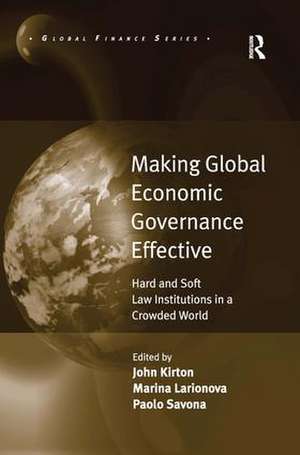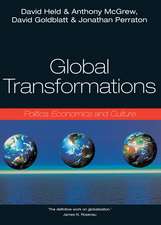Making Global Economic Governance Effective: Hard and Soft Law Institutions in a Crowded World: Global Finance
Autor Marina Larionova Editat de John Kirtonen Limba Engleză Hardback – 28 dec 2009
Din seria Global Finance
-
 Preț: 416.22 lei
Preț: 416.22 lei - 20%
 Preț: 184.81 lei
Preț: 184.81 lei - 27%
 Preț: 501.57 lei
Preț: 501.57 lei - 27%
 Preț: 503.19 lei
Preț: 503.19 lei - 18%
 Preț: 1000.27 lei
Preț: 1000.27 lei -
 Preț: 393.52 lei
Preț: 393.52 lei - 15%
 Preț: 470.31 lei
Preț: 470.31 lei - 30%
 Preț: 769.00 lei
Preț: 769.00 lei - 18%
 Preț: 1005.80 lei
Preț: 1005.80 lei - 18%
 Preț: 1000.27 lei
Preț: 1000.27 lei -
 Preț: 323.23 lei
Preț: 323.23 lei -
 Preț: 469.34 lei
Preț: 469.34 lei - 18%
 Preț: 1011.99 lei
Preț: 1011.99 lei - 31%
 Preț: 764.20 lei
Preț: 764.20 lei - 17%
 Preț: 259.33 lei
Preț: 259.33 lei
Preț: 1000.27 lei
Preț vechi: 1219.84 lei
-18% Nou
Puncte Express: 1500
Preț estimativ în valută:
191.46€ • 208.04$ • 160.93£
191.46€ • 208.04$ • 160.93£
Carte tipărită la comandă
Livrare economică 21 aprilie-05 mai
Preluare comenzi: 021 569.72.76
Specificații
ISBN-13: 9780754676713
ISBN-10: 0754676714
Pagini: 366
Dimensiuni: 156 x 234 x 21 mm
Greutate: 0.45 kg
Ediția:1
Editura: Taylor & Francis
Colecția Routledge
Seria Global Finance
Locul publicării:Oxford, United Kingdom
ISBN-10: 0754676714
Pagini: 366
Dimensiuni: 156 x 234 x 21 mm
Greutate: 0.45 kg
Ediția:1
Editura: Taylor & Francis
Colecția Routledge
Seria Global Finance
Locul publicării:Oxford, United Kingdom
Recenzii
'This volume provides an invaluable and comprehensive treatment of a range of topics covered by the G8 summit process.' Stephen Woolcock, London School of Economics and Political Science, UK 'Utilizing mixed methods research, this book is a rare gem in the field as it comprehensively presents the burning theoretical and empirical scholarly issues about the G8 and its cooperation with other MOs. ... this volume is highly recommended not only for scholars working on international organizations, political economy, and global governance but also for advanced graduate students in the social sciences whose interest in global politics is evident. This is a highly informative volume on which future scholarship on the G8 will be based.' Governance
Notă biografică
John J Kirton, University of Toronto, Canada, Marina Larionova, State University-Higher School of Economics, Moscow and Paolo Savona, University of Rome Guglielmo Marconi, Italy.
Cuprins
I: Introduction; 1: Introduction, Arguments and Conclusions; II: Multilateral Organizations and the G8: Academic Analyses; 2: Multilateral Organizations and G8 Governance: A Framework for Analysis; 3: The New Partnership between Multilateral Organizations and the G8; 4: Financial Crises, the International Monetary Fund and the G8; 5: Finance and Development Compliance in the G8: The IMF and World Bank Role; III: Multilateral Organizations and the G8: Practitioners' Perspectives; 6: Finance, Macroeconomics and the Multilateral Organization–G8 Connection; 7: Development, the Commonwealth and the G8; 8: Trade, the World Trade Organization and the Doha Development Agenda; IV: The St. Petersburg Priorities: Energy, Education, Information and Health; 9: Energy Security and Sustainable Development: The WTO and the Energy Charter Treaty; 10: Energy Security: Russia, the European Union and the G8; 11: Energy Security: The International Energy Agency and the G8; 12: Education, the G8 and UNESCO; 13: Information and Communication; 14: Health Compliance in the G8 and APEC; V: The G8's St. Petersburg Summit and Beyond; 15: The G8 at St. Petersburg and Beyond; 16: The 2006 St. Petersburg G8 Summit
Descriere
This book examines how, and how well, the multilateral organizations and the G8 are dealing with the central challenges facing the contemporary international community, how they have worked well and poorly together, and how they can work together more effectively to provide badly needed public goods. It is an ideal reference guide for anyone interested in institutions of global governance.














